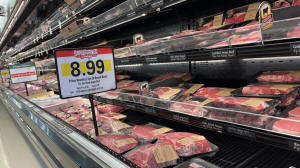|
Starting Jan. 1, 2026, Illinois will eliminate its 1% tax on
grocery items. Gov. J.B. Pritzker included the change in his
fiscal year 2025 budget.
“We eliminated the state sales tax on groceries, which helps
every Illinoisan deal with the effects of higher prices in the
checkout line and keeps food on the table,” the governor said.
The 1% grocery sales tax applies to most foods, as long as it’s
not food intended to be consumed immediately, so takeout and
meals at restaurants don’t qualify.
As soon as Pritzker announced that he planned to eliminate the
grocery tax, city leaders around the state sounded the alarm.
They said getting rid of the tax could be a major blow to their
budgets.
“We have to get every revenue we can in order to keep property
taxes low and to keep the businesses we have in Milan,” Milan
trustee Bruce Stickell said to KWQC TV. “Every time something
gets taken away, you have to come up with another idea and how
you can replace that.”
Critics say the move puts city leaders in a position where they
either have to cut services or raise taxes while the governor
and the legislature are calling it a tax cut.
Highland, Normal and River Forest are just some of the
communities considering reinstating the tax, with more likely to
follow. Each Illinois city will have until October 2025 to pass
an ordinance to continue the 1% tax on groceries in order to
avoid a lapse in revenue.
When the plan was being discussed in the Illinois Senate, Sen.
Andrew Chesney, R-Freeport, blasted the proposal.
“Everybody in this room knows you are not cutting a darn thing,
you are not providing any relief to local municipalities,” said
Chesney. “You are using this for campaign reasons and campaign
reasons only.”
Illinois will join 37 other states that don’t impose a tax on
groceries.

|
|




